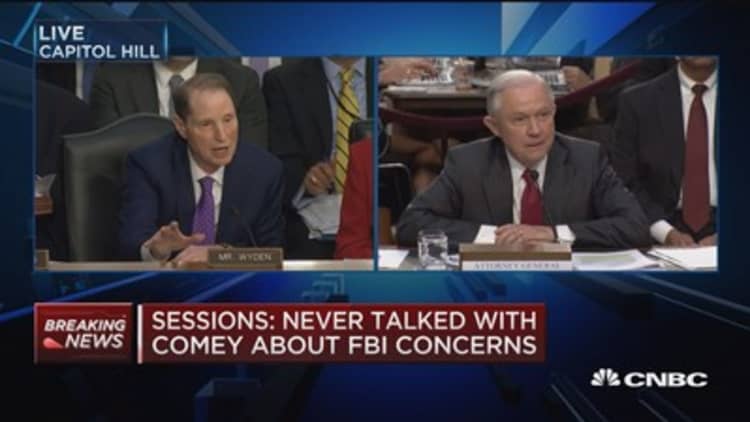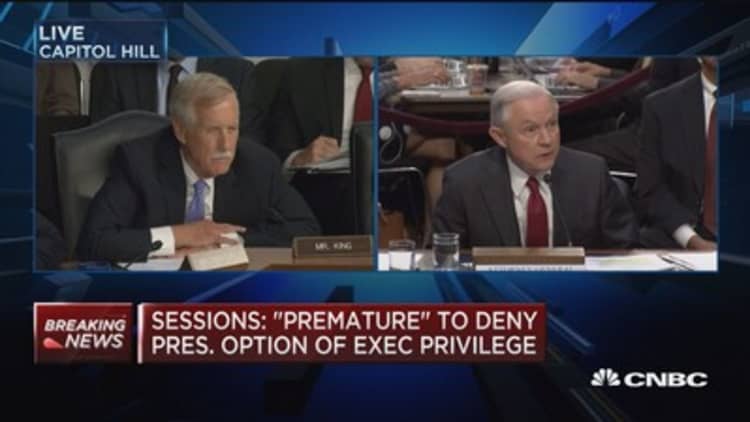
Attorney General Jeff Sessions and Sen. Ron Wyden, D-Ore., got into a sharp exchange during Sessions' hearing before the Senate Intelligence Committee on Tuesday.
The Democratic senator pressed the attorney general about whether there may have been other reasons to explain why he recused himself from the investigation into Russian interference in the 2016 U.S. election.
"Why don't you tell me?" Sessions asked, raising his voice. "There are none. There are none, Sen. Wyden. I can tell you that for absolute certainty."
Sessions insisted that he stepped back from the probe due only to a Justice Department regulation that employees "should not participate in investigations of a campaign if they have served as a campaign advisor."
Sessions won't discuss private talks with Trump
The attorney general repeatedly said he could not discuss whether he had private conversations with President Donald Trump concerning Comey's firing.
When Trump dismissed Comey, the White House said the president did so "based on the clear recommendations of both Deputy Attorney General Rod Rosenstein" and Sessions. Critics have questioned why Sessions was involved in the decision, since he said he was distancing himself from the investigation.
He contended on Tuesday that writing a letter did not violate his earlier recusal. Sessions said it is not a "sound position" to say he could not carry out his duties related to the agencies he oversees because of one investigation.
Sessions said Tuesday that he and Rosenstein had a "clear view" that the FBI had "problems" and needed a fresh start. They were asked their opinions and felt comfortable putting them into writing, the attorney general said.
Their full exchange is below:
WYDEN: Thank you very much, Mr. Chairman. Mr. Chairman, I want to thank you for holding this hearing in the open, in full view of the American people where it belongs. I believe the American people have had it with stonewalling. Americans don't want to hear that answers to relevant questions are privileged and off-limits or that they can't be provided in public or that it would be "inappropriate" for witnesses to tell us what they know. We are talking about an attack on our democratic institutions and stonewalling of any kind is unacceptable and General Sessions has acknowledged that there is no legal basis for this stonewalling. It's not a question.
Last Thursday, I asked Director Comey about the FBI's interactions with you, General Sessions, prior to your stepping aside from the Russian investigation. Mr. Comey said that your continued engagement with the Russian investigation was "problematic" and he, Mr. Comey, could not discuss it in public. Mr. Comey also said that FBI personnel had been calling for you to step aside from the investigation at least two weeks before you finally did so.
Now, in your prepared statement, you stated you received only "limited information ... necessary to inform [your] recusal decision," but given Director Comey's statement, we need to know what that was. Were you aware of any concerns that the FBI or elsewhere in government about your contacts with the Russians or any other matters relevant to whether you should step aside from the Russian investigation.
SESSIONS: Sen. Wyden, I am not stonewalling. I am following the historic policies of the Department of Justice. You don't walk into any hearing or committee meeting and reveal confidential communication with the president of the United States — who is entitled to receive confidential communications and your best judgment about a host of issues — and have to be accused of stonewalling for not answering them, so I would push back on that.
Secondly, Mr. Comey — perhaps he didn't know — but I basically recused myself the day, the first day I got into office because I never accessed files. I never learned the names of investigators. I never met with them. I never asked for any documentation. The documentation, what little I received, was mostly already in the media and was presented by the senior ethics public responsibility-professional responsibility attorney in the department
WYDEN: General-
SESSIONS: And I made an honest and proper decision to recuse myself as I told Sen. [Dianne] Feinstein and the members of the committee I would do when they confirmed me.
WYDEN: General Sessions, respectfully, you're not answering-
SESSIONS: Well, what is the question?
WYDEN: The question is Mr. Comey said that there were matters with respect to the recusal that were problematic and that he couldn't talk about them. What are they?
SESSIONS: I- Why don't you tell me? There are none, Sen. Wyden. There are none. I can tell you that for absolute certainty.
WYDEN: We can-
SESSIONS: You tell- This is a secret innuendo being leaked out there about me and I don't appreciate it and I've tried to give my best and truthful answers to any committee I've appeared before and it's really a- People are suggesting through innunendo that I have been not honest about matters and I've tried to be honest.
WYDEN: My time is short. You've made your point that you think Mr. Comey is engaging in innuendo. We're going to keep digging-
SESSIONS: Well, Sen. Wyden, he did not say that. I don't-
WYDEN: He said it was problematic and I asked you what was problematic about it.
SESSIONS: Some of that leaked out of the committee that he said in closed sessions.
WYDEN: One more question. I asked former FBI director whether your role in firing him violated your recusal given that President Trump said he had fired Comey because of the Russian investigation. Director Comey said this was a reasonable question, so I want to ask you just point blank: Why did you sign the letter recommending the firing of Director Comey when it violated your recusal.
SESSIONS: It did not violate my recusal. It did not violate my recusal. That would be the answer to that and the letter that I signed represented my views that had been formulated for some time.
WYDEN: Mr. Chairman, just if I can finish, that answer in my view doesn't pass the smell test. The president tweeted repeatedly about his anger at investigations into his associates and Russia. The day before you wrote your letter he tweeted that the collusion story was a total hoax and asked when will this taxpayer-funded charade end. I don't think your answer passes the smell test.
SESSIONS: Well, Sen. Wyden, I think I should be allowed to briefly respond at least and would say the letter, the memorandum that Deputy Rosenstein wrote and my letter that accompanied it represented my views of the situation.
More from CNBC:
Sessions: I have 'no knowledge' of Trump campaign collusion with Russia
An 'appalling and detestable lie': Sessions forcefully denies colluding with Russians
How Jeff Sessions fits into the Russia investigation and the firing of James Comey
Watch: Sessions says he never received briefing on Russian interference




